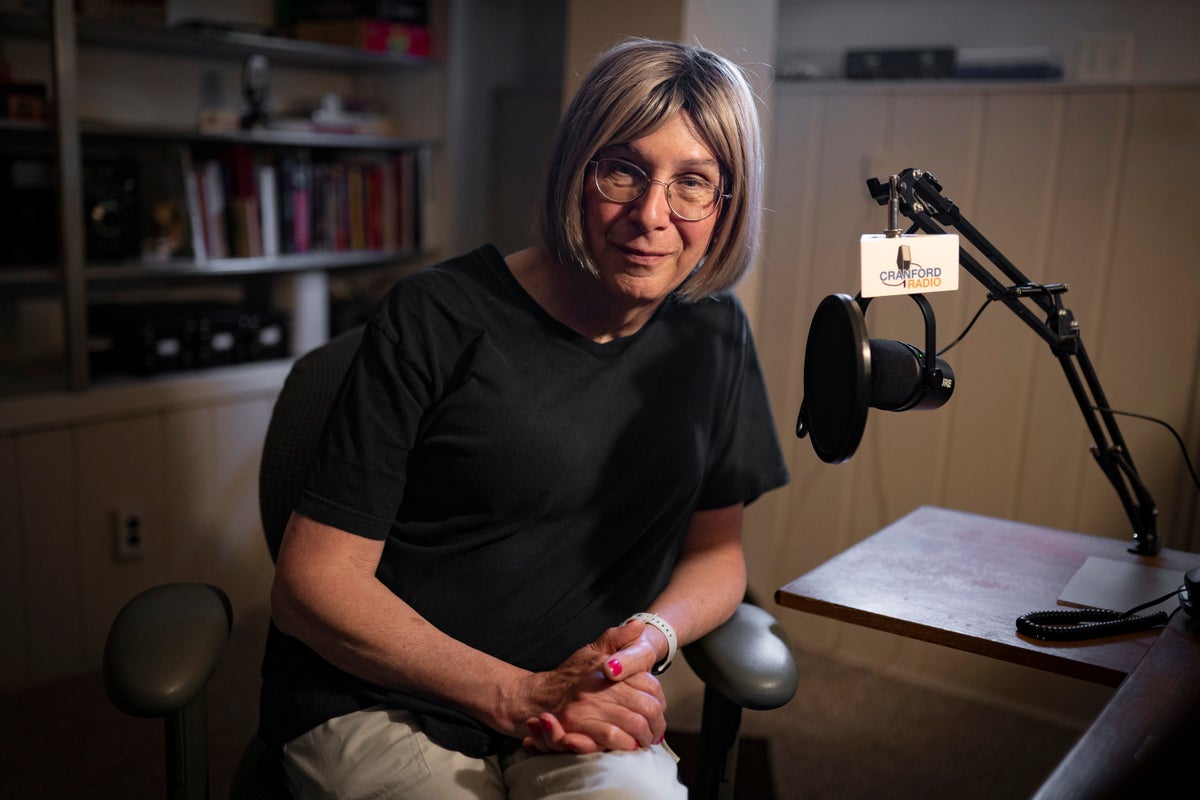
The voice is familiar to the millions who ride New York City's subways, its deep and resonant tone ringing through tunnels and across the tracks. For more than a decade, Bernie Wagenblast has lent that voice to automated announcements alerting passengers to train arrivals and politely directing people to “please stand away from the platform edge.”
But earlier this year, Wagenblast, 66, went on the radio to publicly reveal a different voice — higher pitched and softer spoken — that is more reflective of the transition from the man he was to the transgender woman she was always meant to be.
For decades, Wagenblast’s voice — low, authoritative and benign all at once — has provided a career and livelihood. Yet she knows that her transformation won’t be complete unless she replaces her “guy voice” with one that has the vocal register, timbre and tone of a woman.
“Because my voice has played such a critical role in my life, to me it’s important that my voice sound as authentically female as it can,” she said at her home in Cranford, New Jersey, about 20 miles (33 kilometers) southwest of Manhattan.
The change won’t affect the subway announcements that have made Wagenblast’s voice recognizable. There are no plans to rerecord the work she did for the Metropolitan Transportation Authority, which operates the country’s busiest public transit system, or for the Port Authority of New York, which uses her voice for announcements on the AirTrain that serves Newark airport.
By sharing her story, she aspires to use her new voice, literally and figuratively, to inspire and empower others struggling with gender dysphoria during fraught times for LGBTQ+ communities, especially amid a wave of legislation restricting their rights across the country. Lawmakers in 20 states have moved to ban gender-affirming care. Some new laws keep transgender students off girls sports teams or out of certain bathrooms. Still others limit drag performances.
“I think just my existence, by sharing my story, helps to make people understand,” Wagenblast said.
Wagenblast knew as a child that she was meant to be a girl. But different social mores prevailed at the time, so she kept her secret inside as she got older.
She embraced the voice she had and pursued a career in radio, contributing to several stations in New York as an on-air traffic reporter.
More than a dozen years ago, Wagenblast landed the job that has given her an audience of millions.
The MTA uses several announcers in its system. Wagenblast's voice is heard on most numbered train lines. Another oft-heard message, “Stand clear of the closing doors, please,” is voiced by a different announcer, Charlie Pellett.
Now semi-retired, Wagenblast continues to produce transportation-themed podcasts and newsletters.
Although Wagenblast is retraining her voice for a more feminine sound, she won’t leave her former voice totally behind — she can switch between vocal registers — because she could still use it professionally.
“I’m happy that millions of people are familiar with it,” she said. “Almost everybody who lives in New York has heard my voice at one time or another, and that just kind of blows my mind to think 8 million people — more than 8 million people — know my voice.”
Wagenblast is mindful of all the strife and mental anguish suffered by transgender people still too afraid to become their true selves publicly, as she once was.
Over the years, she’s revealed her gender identity to family, including the woman Wagenblast married.
“I did tell my future wife, before I asked her to marry me, about this part of my life because I knew it was not going to change,” Wagenblast said, “and I wanted her to know that before I asked her to marry me.”
Together, they raised three daughters. They separated right before Wagenblast began socially transitioning and presenting as a woman.
One night last fall, Wagenblast decided to attend a community event as a woman, her first time doing so publicly. That night, she put on a wig and wore a borrowed dress. A friend did her makeup.
“In the past year, Bernie had concerns with acceptance, with people accepting her for who she is, how she wanted to appear, how she wanted to sound,” said Nicole Brownstein, who ran a support group at a New Jersey pride center and befriended Wagenblast several years ago.
Brownstein called coming out a double-edged sword that makes transgender communities more visible but also “brings you into the public eye and potentially makes you a target.”
As communities across the country celebrate Pride Month, transgender rights are front and center at some parades and other festivities as a show of solidarity. But organizers of Sunday’s annual Pride Parade in New York City, the nation’s largest commemoration of the 1969 riots that launched the gay rights movement, say the hostile acts “disproportionately targeting our trans siblings are disturbing and devastatingly not new.”
Waiting for a train at Grand Central Terminal, rider Billy Navarrete said she considered it unimportant that the voice she hears now belongs to a transgender woman.
“I think it’s fine because now they’re their true self. So I’m happy for them,” she said, before correcting the pronoun to “her."







